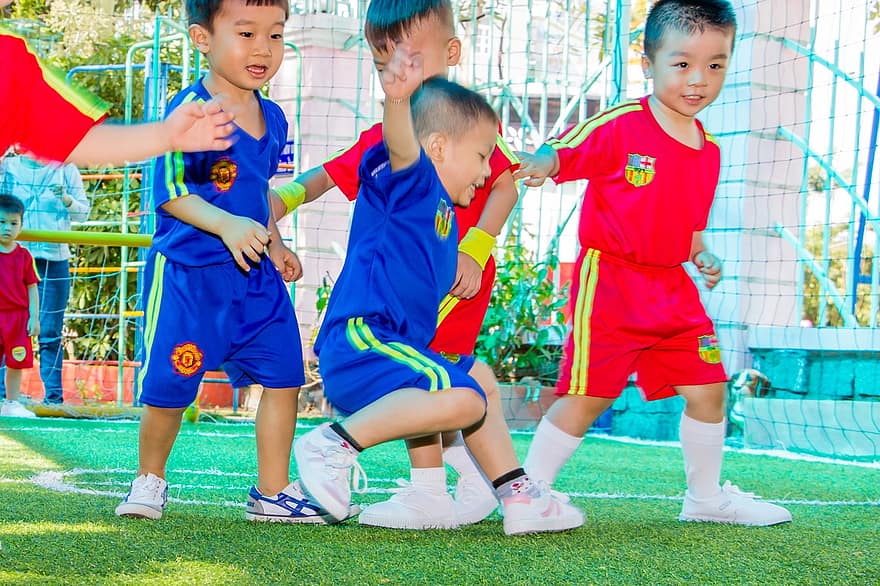Play is a natural and essential part of childhood. Throughout the ages of human history, children have always played games of imagination and skill-building, even without realizing they were doing so. Play begins in the cradle and remains a constant of life throughout childhood and beyond.
What many parents don’t realize is that play is also highly educational and beneficial for their children. Many homeschooling parents and Montessori schools put a major emphasis on play and creative thinking during their instructional time, but many public schools around the world neglect to do so. Some traditional approaches to education see play as a waste of time, or something that children can do between classes but not during. However, there are big benefits to making play part of your school day, regardless of setting.
The Conflict of Confucian Principles with Play-Based Learning
When it comes to education in Asian nations, play is widely-researched and understood to be beneficial – but also difficult to fully and successfully implement. Why is this? Because cultural and societal expectations for children brought on by the embracing of Confucian principles that encourage academic achievement and obedience. As such, adults in the education sector – as well as parents – have long been taught to implement strong discipline and eliminate unnecessary play. While this has certainly resulted in students with very high levels of achievement, it has also created unnecessary stress and disdain for the learning environment and children who are not receiving the big benefits of play.
Other Roadblocks to Play-Based Learning
The societal norms in Asian countries are not the only problem with easily implementing play-based instruction and learning. There is also the landscape; access to natural, outdoor settings means that safe outdoor play is difficult to come by. This not only makes it hard for children to get adequate exercise, it makes the kind of play that children in Western nations routinely enjoy less of a commonality, too.
That doesn’t mean children in Asia cannot enjoy the benefits of play! It simply means that parents and teachers in these areas have to be more creative and implement more planning to ensure that these opportunities are made available. Some schools across Malaysia, Singapore and Japan, Hong Kong, specifically, have implemented travel programs and partnered with both local and national organizations to provide safe, engaging outdoor play opportunities for children. It’s all about creating the chances kids need – and the changes in the understanding of the benefits of play are making that possible across the continent.
Play-Based Learning – What are the Benefits?
You’ve heard a lot thus far about the importance of play in the development of children – but what are the actual benefits?
Just some of the important learning that happens during play includes:
- Skill-building. No matter what kind of play your child is engaging in, they can improve numerous skills through it. Better writing, reading, simple math skills, and more couple with physical skills such as using an indoor voice and communicating needs effectively. All of this is born of the playtime environment and will follow children throughout their school years and beyond.
- Improving coordination and refining motor skills. Play of all kinds improves hand-eye coordination, motor skills, and more. Young children learn movement skills while older children improve their balance, self-control, and use of their hands through play.
- Enhancing social skills. Playing with peers gives children the opportunity to develop and practice using important social skills. Communication, cooperation, and collaboration are all fostered in the group and partner play environment.
- Improving mood, behavior, and sleep. It may seem contrary to the understanding that some parents and teachers have, but allowing children to move more, be louder, and interact with less restraint actually has positive impacts on their overall mood, their behavior during the rest of the school day, and their health via better and more restful sleep. Children who are active in both body and mind during the day will sleep better and night, causing less irritability and distractability.
These benefits apply to children of all ages, of course, but many are especially important to children under the age of six. This preschool level of learning creates the building blocks for the rest of the educational and developmental career – and indeed, life itself. This is why so many preschools and early learning centers worldwide put so much emphasis on play-based activities, and why school settings for older children are increasingly embracing them, too.
The Advent of Play-Based Learning as Commonplace in Eastern Schools
Play-based learning isn’t new, but the movement to embrace it in mainstream Asian culture is. This has been a huge selling point for expatriate families, who are eager to provide the best possible education for their children.
Today, more and more private and international schools are implementing curricula that involve a heavy focus on play-based learning. This means that demographics of children who have long been taught via rote learning and more traditional methods are now enjoying more play in their day – and parents and teachers alike are seeing the positive results.
Talk to the administrators at your child’s school about what curricula they utilize and the emphasis on play-based instruction in those systems. You’ll feel better about your child’s development and growth knowing that play is the basis of it all!























